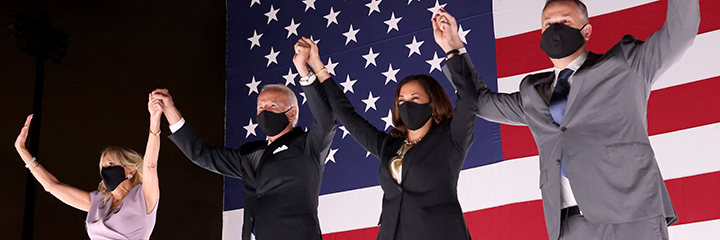With the presidential election less than two months away, American voters face a barrage of candidate attacks, a flurry of tweets, and the prospect of intervention by foreign countries in the US election. The question for many is what – and who – to believe. In the latest Economist/YouGov Poll, former Vice President Joe Biden holds a nine-point lead over President Donald Trump among likely voters, but there are signs that the structure of the race could change — especially if those who did not vote in 2016 also sit out the 2020 election.
Up until this point in the race, The Economist/YouGov Poll reported the trial heat based on registered voters. This is the first iteration for the 2020 presidential race to incorporate a likely voter filter, meaning the registered voters who say they will definitely or probably vote. President Trump fares a little better among all registered voters (42% vs 49%), than he does likely voters, but in this poll, his supporters are somewhat less likely that Biden’s to say they definitely or probably will vote.
Nearly nine in 10 (86%) of Biden voters say they will definitely vote, compared with four in five (80%) Trump supporters. The president’s voters are also slightly less likely than voters to describe voting as very important this year. The vast majority in both groups (93% of Biden supporters and 89% of Trump voters) say that it is.
The Biden lead comes from a variety of factors: one in particular is that he has been able to hold on to more than nine in ten of those who voted for Hillary Clinton in 2016. But, the critical factor remains the matter of turnout. Among those who did not vote in 2016 but are counted as likely voters today, Biden leads President Trump by nearly two to one (60% to 33%).
While a large percentage of those 2016 non-voters (43%) are under the age of 30, a majority are older, and the question is whether or not they will turn out this year when they didn’t do so in 2016. If they don’t vote once again, the race becomes closer: 51 percent for Biden to 44 percent Trump among likely voters, and a narrower margin (48% to 44%) among all registered voters.
The national share of the vote may not matter if the election is decided by very tiny margins in the battleground states. In 2016, Hillary Clinton carried California by more than 4,000,000—more than her national margin of victory. Without California, Biden’s lead shrinks by two points.
And the president continues to have an enthusiasm advantage, although it may have shrunk in the last week. More Trump voters than Biden voters are very or extremely enthusiastic about voting this year, however, similar numbers in each group call themselves extremely enthusiastic.
There was a significant drop in enthusiasm for the president’s voters in the last week, however. Last week’s poll was conducted just after the Republican National Convention ended, and enthusiasm among the president’s voters jumped 11 points. It has now dropped back to its pre-Convention level.
Among all registered voters Biden gets better evaluations than the president when it comes to the two men’s ability to handle both the coronavirus and crime. The difference is striking when it comes to the coronavirus, but there is a significant amount of skepticism about both Biden and the president’s ability to handle crime. More are uneasy about the president than about Biden on this issue.
Biden is more liked than the president by voters in general. He is less likely than the president to be thought of as holding extreme views. Although more than three in four Trump voters see Biden as a liberal, more than half of his own voters view him as a moderate.
Just 37 percent of voters say Biden holds extreme views. Both Biden and Trump supporters mostly regard the president as a conservative (although a third of Biden’s voters aren’t sure how to describe the president’s ideology). Biden supporters, and most registered voters, believe the incumbent holds extreme political views. Nearly a third of the president’s own supporters agree.
latest, more positive, jobs report hasn’t changed much when it comes to the evaluation of President Trump’s performance on that issue. This week, about half (48%) of registered voters approve of his handling of jobs and the economy, but 46 percent disapprove.
But for most voters, this has not been an election about issues or about what each candidate might do if elected: more than a third of voters don’t have a clear idea of the policies each man would enact if elected this fall. In addition, a majority (56%) of voters believe the president is spending more time attacking Biden than explaining his policies; fewer say Biden is attacking the president, though 42 percent think he is. About half (49%) say Biden is explaining his positions. Just 35 percent say that about President Trump.
See the toplines and crosstabs from this week’s Economist/YouGov Poll
Methodology: The Economist survey was conducted by YouGov using a nationally representative sample of 1,500 U.S. adult citizens interviewed online between September 6 - 8, 2020. This sample was weighted according to gender, age, race, and education based on the American Community Survey, conducted by the US Bureau of the Census, as well as 2016 Presidential vote, registration status, geographic region, and news interest. Respondents were selected from YouGov’s opt-in panel to be representative of all US citizens. The margin of error is approximately 3.4% for the overall sample.
Image: Getty









